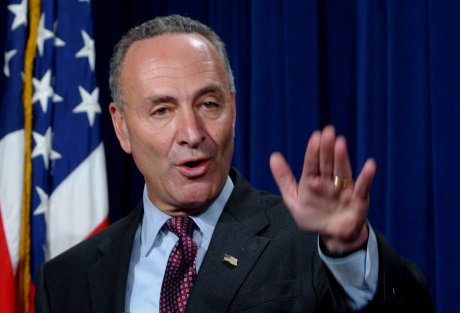 Sen. Charles Schumer, D-N.Y.
Sen. Charles Schumer, D-N.Y.
WASHINGTON (AP) -- The Senate is taking up a bill Tuesday that would repeal about $2 billion a year in tax breaks for the five biggest oil companies, a Democratic response to $4-a-gallon gasoline that might fare better when Congress and the White House negotiate a deal later this year to increase the government's ability to borrow.
The evening vote is expected to fail. But Democrats hope to build their case to include the measure in a deficit-reduction package being negotiated by key lawmakers and the Obama administration. Lawmakers from both parties are demanding deficit reduction as part of deal to increase the government's ability to borrow and avoid an unprecedented default on U.S. Treasury bonds.
The oil companies are "doing just fine at every level of their business, and we're giving them a taxpayer subsidy?" said Sen. Charles Schumer, D-N.Y. "This is a place to start."
The heads of the five oil companies defended the tax breaks at a Senate hearing last week, saying they just want the same tax advantages enjoyed by other industries. The companies are Shell Oil Co., ExxonMobil, ConocoPhillips, BP America and Chevron Corp.
Together, they logged profits totaling $36 billion during the first quarter. The Democrats say that with profits that high, the big oil companies wouldn't miss tax breaks that average $2 billion a year.
Senate Republicans and some Democrats oppose the tax increases. They note that the bill would do nothing to lower gas prices.
"With Americans looking for real relief, symbolic votes like this that aim to do nothing but pit people against each other will only frustrate the public even more," said Senate Republican Leader Mitch McConnell of Kentucky. "Americans aren't interested in scapegoats. They just want to pay less to fill up their cars."
A GOP measure designed to increase offshore drilling is scheduled for a Senate vote on Wednesday, though it is not expected to pass, either. The GOP bill would direct the secretary of the Interior to conduct previously scheduled offshore lease sales in the Gulf of Mexico, Virginia and Alaska.
Republicans argue that their bill would increase domestic oil production which would eventually lead to lower gas prices.
President Barack Obama has directed his administration to ramp up U.S. oil production by extending existing leases in the Gulf of Mexico and off Alaska's coast and by holding more frequent lease sales in a federal petroleum reserve in Alaska. The moves, however, are not expected to calm spiraling prices at the pump any time soon.
Gasoline is more than $4 a gallon in many parts of the country. The national average is $3.94 a gallon for regular unleaded, up from $2.87 a gallon a year ago, according to AAA.
Five Democratic senators, led by Missouri's Sen. Claire McCaskill, asked the Federal Trade Commission Tuesday to investigate "potential price fixing of gasoline by U.S. refiners." The senators said U.S refineries have cut back production even as gas prices rose, increasing their profit margins.
Obama has called for eliminating tax breaks for all oil and gas companies every year since he took office in 2009, a proposal that would raise an estimated $44 billion over the next decade. Lawmakers, including Democrats from oil-producing states, complained that Obama's proposal would raise taxes on many small and medium-sized businesses involved in oil production.
The bill being voted on Tuesday would target only the five largest oil companies, raising about $21 billion over the same period.
The most generous tax break is a deduction available to U.S. manufacturers across industries. Under the provision, oil and gas companies were classified as manufacturers, but their deduction was capped at a lower rate than other industries.
Another subsidy, established in 1913 to encourage domestic drilling, allows oil companies to deduct more quickly the costs of preparing a site for drilling. Another allows oil companies to reduce their American taxes by deducting royalties paid to foreign governments.
The nonpartisan Congressional Research Service concluded that eliminating the tax breaks would be unlikely to result in higher gasoline prices, which are influenced by a host of factors. The report said eliminating the tax breaks would raise about $1.2 billion in 2012. By comparison, the five oil companies had combined revenues of $1.5 trillion last year.
Portland and Seattle
Free Subscription to Breaking News
Free Subscription to Breaking News





















































































































































































































































































































































